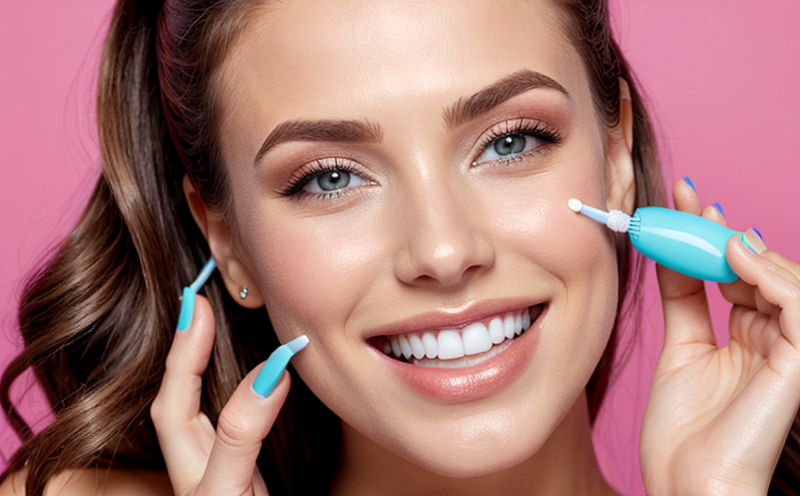Nanoparticle Safety Testing in Cosmetic Toothpastes
The use of nanoparticles in cosmetic products such as toothpaste has gained significant attention due to their potential benefits, including improved efficacy and texture. However, the safety concerns related to nanoparticle exposure have also raised serious questions that need to be addressed through rigorous testing protocols. This service focuses on ensuring the safety of nanomaterials used in cosmetic toothpastes by providing comprehensive particle size analysis, toxicity evaluations, and risk assessments.
Nanoparticles are defined as particles with at least one dimension less than 100 nanometers (nm). In the context of oral care products like toothpaste, these materials can be used for various purposes such as enhancing the texture, improving aesthetics, or providing active ingredients. The challenge lies in understanding how these nanoparticles behave when they come into contact with biological systems and whether there are any adverse effects.
Our laboratory employs advanced analytical techniques to characterize the size distribution of nanoparticles present in cosmetic toothpaste formulations. By using transmission electron microscopy (TEM), dynamic light scattering (DLS), and zeta potential measurements, we can determine critical parameters such as particle size, shape, aggregation state, and surface charge. These characteristics play a crucial role in dictating the interaction between the nanoparticle and biological systems.
Once characterized, our scientists conduct toxicity assessments on isolated cells or animal models to evaluate the potential risks associated with nanoparticle exposure. This includes examining endpoints such as cell viability, oxidative stress levels, genotoxicity, and inflammation markers. The data generated from these studies helps us establish safe limits for nanoparticle concentrations in cosmetic toothpaste formulations.
The final step involves risk assessment where we integrate all available information about the nanoparticles into a comprehensive framework that considers both intrinsic properties of the material itself as well as extrinsic factors such as application route, exposure duration, and individual susceptibility. Based on this analysis, we provide recommendations for optimizing formulation design while minimizing health risks.
Understanding nanoparticle safety is not just important from an ethical standpoint but also crucial for regulatory compliance purposes. Regulatory agencies worldwide are increasingly focusing on nanotechnology applications in consumer goods including cosmetics. Therefore, having robust evidence supporting the safe use of nanoparticles can help companies navigate complex regulations more effectively and gain competitive advantages by staying ahead of industry trends.
By partnering with our laboratory, you will receive reliable data that supports decision-making processes related to nanoparticle inclusion in cosmetic toothpaste formulations. Our expertise ensures that your products meet international standards such as ISO 18743:2015 and FDA guidelines for nanotechnology assessment.
- Transmission Electron Microscopy (TEM)
- Dynamic Light Scattering (DLS)
- Zeta Potential Measurements
- Toxicity Assessments Using In Vitro Models
- Risk Assessment Framework Incorporating Both Material Properties and Exposure Factors
Why It Matters
The safety of nanoparticles in cosmetic toothpaste is a critical issue that impacts not only individual health but also broader societal concerns. As consumers become more aware of nanotechnology applications, they expect manufacturers to demonstrate transparency regarding product ingredients and potential risks.
Regulatory requirements are becoming increasingly stringent across different regions, making it essential for companies to conduct thorough testing before bringing new products to market. Non-compliance can lead to severe penalties including recall orders or even legal actions against the manufacturer.
In addition to meeting legal obligations, prioritizing nanoparticle safety demonstrates a commitment to responsible innovation and corporate social responsibility (CSR). It fosters trust between brands and their customers who appreciate companies that prioritize long-term sustainability over short-term profits. This approach can significantly enhance brand reputation leading to increased customer loyalty and market share growth.
From a business perspective, investing in nanoparticle safety testing offers several strategic advantages. For instance, early identification of potential issues allows for timely adjustments during product development stages reducing costs associated with post-market recalls or reformulations. Furthermore, demonstrating commitment to high-quality standards can attract investors interested in sustainable practices and contribute positively towards achieving corporate sustainability goals.
Moreover, staying ahead of emerging trends means companies are better positioned to capitalize on innovation opportunities within the rapidly evolving nanotechnology sector. By leveraging advanced analytical methods like those offered by our laboratory, they can stay competitive and continue leading industry advancements.
Quality and Reliability Assurance
- Data Accuracy: Our laboratory adheres strictly to internationally recognized standards such as ISO 18743:2015 for nanotechnology assessment. This ensures that all measurements are accurate and reliable, providing you with confidence in the results.
- Consistency: We employ stringent quality control measures throughout each step of our testing process to maintain consistent standards across multiple samples or batches.
- Objectivity: Our team comprises highly qualified professionals who remain impartial when interpreting test data, ensuring objective conclusions are drawn without bias.
- Transparency: Full disclosure of methodology and raw data allows for independent verification by third parties if necessary. Transparency fosters trust between clients and our laboratory.
In addition to these technical aspects, we also offer comprehensive documentation supporting all findings which can be easily shared with regulatory bodies or used internally during discussions about future product developments.
Competitive Advantage and Market Impact
As the demand for safer and more effective cosmetic products continues to grow, so does competition among manufacturers. By partnering with our laboratory for nanoparticle safety testing in cosmetic toothpaste formulations, you can gain significant competitive advantages:
- Innovation Leadership: Stay ahead of competitors by being first to market with innovative product offerings that prioritize health and safety.
- Brand Reputation: Demonstrate a commitment to responsible innovation which enhances brand reputation and fosters customer trust.
- Regulatory Compliance: Ensure compliance with ever-changing regulations regarding nanotechnology applications in consumer goods, avoiding costly penalties or delays during product launches.
- Sustainability: Align your business practices with global sustainability initiatives, contributing positively to environmental protection efforts and social responsibility goals.
The insights gained from our rigorous testing protocols enable companies not only to meet current regulatory requirements but also anticipate future changes in legislation or consumer expectations. This forward-thinking approach ensures long-term success within the competitive landscape of the cosmetics industry.





